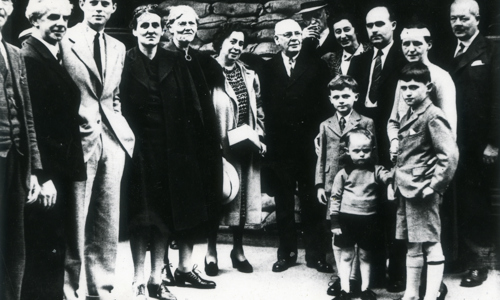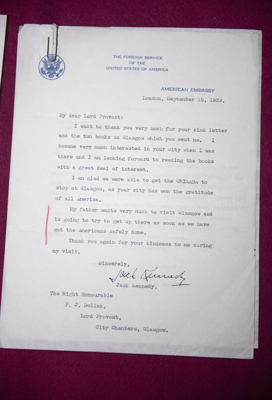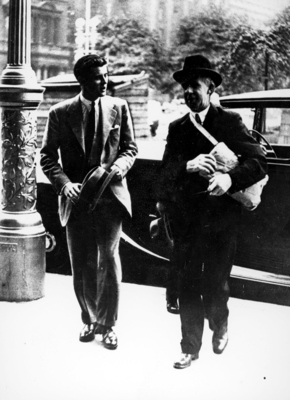
A young John F Kennedy visited Glasgow to meet survivors of the TSS Athenia who were cared for in Glasgow
A young John F Kennedy visited Glasgow to meet survivors of the TSS Athenia who were cared for in Glasgow
3 September 2019
On the 80th anniversary of the sinking of TSS Athenia, attacked on the day World War 2 was declared in September 1939, Glasgow City Archives has shared details of a Disaster Fund file set up to help victims. It contains fascinating letters and telegrams of thanks from a young John F. Kennedy.
Glasgow City Archives has shared details of a Disaster Fund file set up to help victims of the TSS Athenia disaster. It contains fascinating letters and telegrams of thanks from a young John F. Kennedy, who visited American survivors being cared for in Glasgow, from his father Joseph Kennedy, the US Ambassador to the UK and President Franklin Roosevelt. It holds photographs, letters and newspaper clippings detailing the fundraising effort and how the city and individuals helped all those caught up in the tragedy.
The disaster fund was initiated by the Lord Provost of Glasgow, Patrick Dollan. He invited Ambassador Kennedy to travel from London to Glasgow. The immense activity of the time resulted in Joseph Kennedy sending his son, a fresh-faced 22 year old John F. Kennedy to represent him. His mission was two-fold; to reassure those affected by the torpedoing of the ship that they would be safely transported back to the US and to gather first-hand information as to the actual circumstances of the attack. This would have been a first for JFK, it was as important for him as it was for Glasgow.
JFK arrived in Glasgow on Thursday 7 September and was welcomed by Patrick Dollan, together they visited around 150 survivors in hospital and at local hotels. John F. Kennedy said:
I have never seen people more grateful for all that has been done for them by Glasgow than those to whom I have spoken today.
Immediately afterwards a telegram from Joseph Kennedy states:
May I on behalf of the President and people of the United States express heartfelt thanks to you and your citizens of Glasgow for this humane and generous action in aiding survivors of the Athenia disaster.

A letter from President Franklin Roosevelt said:
I wish you to know how deeply I and the American people appreciate the efficient, generous and humane manner in which Glasgow and its citizens came to the help of our fellow countrymen and women in their need. I assure you that Glasgow’s gesture will not be forgotten.

Michael Gallagher, archivist with Glasgow City Archives and Clare Thompson, librarian at the Mitchell Library showed the telegrams, photographs and scrap book recollections of John F. Kennedy’s visit to Glasgow.
Glasgow City Archive collection explores Glasgow’s rich and fascinating history through the public records held in the Mitchell Library. The Athenia disaster relief fund file also contains many letters from ordinary Glaswegians and beyond donating money and offering accommodation. It records the amount raised by the appeal fund at various times and lists of donors. Over £2,000 was raised in 24 hours, and almost £6,000 in total, which is equivalent to over £250,000 today. It assisted in housing survivors in hotels and went towards food, clothing and some spending money for those affected. The city also arranged tours of Loch Lomond, afternoon tea at the City Chambers and even a performance by Harry Lauder.
Photographs of JFK arriving at the City Chambers and newspaper clippings from the visit are held in Glasgow’s Special Collections, also based at the Mitchell Library. Anyone can request access to a wealth of local and family history, newspapers, maps, photographs, rare books and some artworks on a wide range of subjects, which are unique and distinctive.
Glasgow Museums Chair, Councillor David McDonald, said:
Glasgow City Archive and Special Collections, housed in the Mitchell Library, are a fascinating treasure trove of all manner of detailed records relating the city. It is a wonderful source of information for those interested in family and social history or numerous types of research.
Reading these telegrams and looking at the photographs is like stepping back in time. We can see from the warm language used just how grateful the US is to Glasgow. President Roosevelt was instrumental in setting up the US National Archive. He summed up its importance beautifully when he said a nation must believe in three things: the past, the future and above all the capacity of its people to learn from the past so they can gain in judgements to create their own future.
The Athenia was outbound from Glasgow, Liverpool and Belfast to Montreal with over 1,000 passengers on board, including 311 Americans. It was the first maritime casualty of the war, claiming 122 lives, 30 of whom were from the United States of America. The deliberate sinking by Germany changed American public opinion, which ultimately lead to the US offering Britain and France support during WW2.
Riverside Museum, Glasgow has a display dedicated to the ship and tells the story of the sinking. The ship was built in Glasgow in 1923 for the Anchor-Donaldson Line, which later became the Donaldson Atlantic Line. She worked between the United Kingdom and the east coast of Canada until September 1939.
